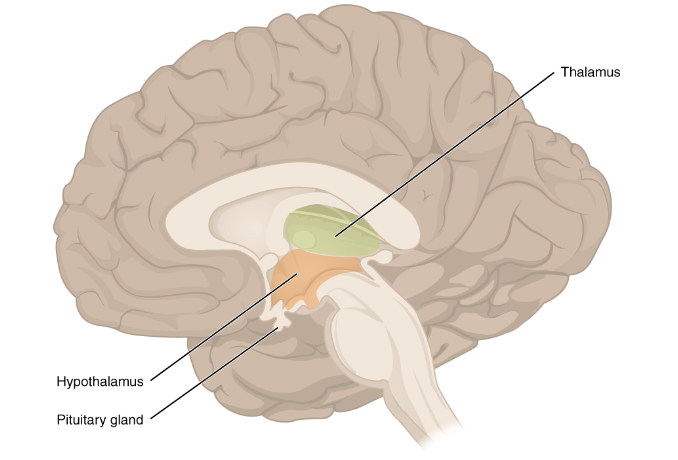What are the functions of the hypothalamus, pituitary gland, and thalamus?

Understand the Problem
The question is likely asking about the functions or relationships of the brain structures labeled in the image: hypothalamus, pituitary gland, and thalamus. The high-level approach to solve it would involve explaining the roles of these structures in the brain.
Answer
Hypothalamus: homeostasis & hormone release. Pituitary gland: hormone regulation. Thalamus: sensory relay.
The hypothalamus maintains homeostasis by controlling body temperature, hunger, thirst, mood, and the release of hormones via the pituitary gland. The pituitary gland produces hormones that regulate various body functions and other endocrine glands. The thalamus acts as a relay station for sensory and motor signals to the cerebral cortex.
Answer for screen readers
The hypothalamus maintains homeostasis by controlling body temperature, hunger, thirst, mood, and the release of hormones via the pituitary gland. The pituitary gland produces hormones that regulate various body functions and other endocrine glands. The thalamus acts as a relay station for sensory and motor signals to the cerebral cortex.
More Information
The hypothalamus, pituitary gland, and thalamus are vital components of the brain, each with specific roles essential for maintaining body function and coordination.
Tips
Common mistakes include confusing the locations of these structures or attributing the functions of one to another. It's also important to remember that the thalamus is primarily involved in sensory signal processing rather than hormone secretion.
Sources
- The Pituitary Gland and Hypothalamus - courses.lumenlearning.com
- Hypothalamus: What It Is, Function, Conditions & Disorders - my.clevelandclinic.org
- Functional Anatomy of the Hypothalamus and Pituitary - NCBI - ncbi.nlm.nih.gov
AI-generated content may contain errors. Please verify critical information